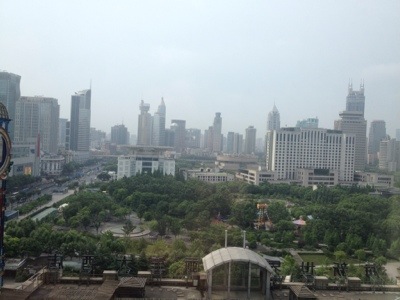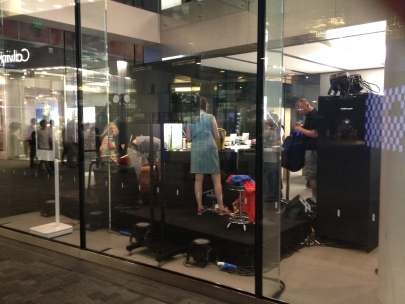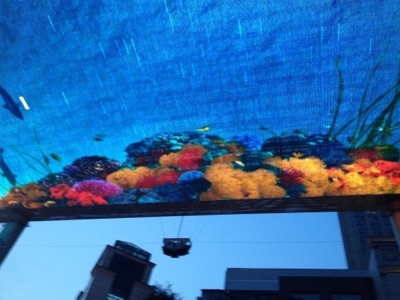Half-Assed Expat
June 22, 2012
Made it to Shanghai in one piece. The actual flight from Linyi to Shanghai is less than an hour, so really easy to get here. In some ways it feels like being released out into civilization. It has been four years since I was last here and the city is even more refined and polished than it was the last time I was here.
This is what I woke up to when I walked into my hotel bathroom this morning.
The city is definitely China’s best foot forward on the world stage with the potential to rival any other great world city. I don’t think I can use enough superlatives to describe the city. Suffice it to say it’s definitely the center of creativity, commerce, and class in China. Part of it definitely has something to do with the sheer number of expats here.
I’m sitting in a cafe called Sunflour on Anfu Road (安福路) that could be in London, Sydney, or San Francisco and it’s filled with a mix of expats and locals. The menu is salads, sandwiches, and lots of fresh baked goods. I’m listening to two foreign girls talk about their trips to Urumqi and marathons in Thailand, as well as their plans for the night. I forgot how everyone of a certain set knows each other when you live overseas. It was the same thing when I lived in Hong Kong, so it’s nice to know there is some continuity to this whole lifestyle.
But Shanghai is unreal. I’m not sure if it is what the rest of China aspires to, especially given the central governments own bias against Shanghai due to it’s long history of foreign influence. Just to recap – when China was forcibly opened up by the Europeans and Americans in the mid 1800s, Shanghai was carved up among the French, Germans, Americans, and British. The city developed a reputation as the Paris of the East and as a den of sin and iniquity. When the Communists came to power, they sought to stamp out all traces of the old Shanghai. When China opened up on its own terms in the 90s, Jiang Zemin and Zhu Rongji, who were the president and premier, respectively, hailed from Shanghai and strongly promoted the city’s development. When Hu Jintao and Wen Jiabo came to power in the 2000s, the so called “Shanghai Faction” fell out of favor and the leaders in Beijing sought to promote harmony, not the decadence a city like Shanghai represents. That’s not to say that Shanghai stopped developing and changing, but the city did not receive the same support from Beijing. Having spent time in places like Linyi, I don’t think Shanghai is what these cities want to be. Whether that’s because of government influence or the fact that many Chinese people have at most spent a few days here, I don’t think this is the way forward for the rest of China.
There is something very comfortable and familiar about the city. It’s what happens when the iPhone class infiltrates a place and starts to remake it in its image. The nationality of the iPhone owner does not matter. It’s a mindset. Without being too glib, the iPhone class likes cute boutiques, gourmet coffee, trendy restaurants and bars, and whatever else may be on trend at that moment. These predilections begin to influence the communities in which they live and dictate the patterns of development. I could really be anywhere in the world right now, which is both comforting and unsettling at the same time. When I am in places like Shanghai, I am reminded of being 22 and an expat banker in Hong Kong. Listening to these foreigners who have made their home in Shanghai, it strikes me as part escapist (whether escaping an identity and life or a dire economic climate back home) and this desire to sound worldly. It’s easy to sound worldly when you’re jetting off to Shanghai for the weekend or running a marathon in Thailand. I’m guilty of this, too to some degree, but I’m kind of a half-assed expat. I like to flit into countries like China for a few weeks or a city like London for a long weekend and then flit right back home.
Okay, enough musing for one afternoon. It’s almost time to move on from this cafe and find a place to get my hair cut and then move hotels and meet my friend, Amy.
Aspirational
June 21, 2012
Week two has come to a close. It’s a national holiday tomorrow to celebrate the Dragon Boat Festival (端午节). The festival only became a national holiday in on the mainland in 2008, having not been celebrated since the 1940s. Since it’s a three-day weekend, I am off to Shanghai to meet up with a friend and check out the changes that the city has undergone since I was last there in October 2008. It should definitely be insightful to check out China’s largest and most outward looking city.
I’ve been thinking a lot about Western companies trying to crack the Chinese market. As growth slows down in many companies’ home markets, China and it’s potentially massive market looks more and more attractive. Some Western brands have been here for decades and for some companies, China is an important driver of revenue. However, for every company that is profitable in China, there are many more that have not figured out the market. The New York Times may have been reading my mind when the published an article yesterday about how more companies are moving executives to China. It used to be that companies had a branch office or subsidiary in the region, but the top executives remained in the company’s home country. The article describes how that is changing as companies move some of their top-level executives to the region with the belief that being on the ground may make it easier to crack the China market.
Having sent a few days in Beijing before arriving here in Linyi, I was able to see first-hand how foreign companies have tried to crack the China market. Retailers that would not be out of place on any London High Street or in Soho abound in Beijing. The stores are not overrun with only expats, but Chinese consumers who have embraced these brands. There are also many Chinese brands that one can find in cities all around China, brands that one has never encountered in the U.S. such as Meters//bonwe (casual clothing), Li-Ning (athletic wear), Septwolves (clothing), SPR Coffee (like Starbucks), and Dicos (Chinese fast-food akin to McDonalds and KFC). Will these brands move beyond their national borders to open flagships on Fifth Avenue in New York and Harajuku in Tokyo or will they remain exclusively Chinese brands. Will foreign brands such as Uniqlo, GAP, H&M, Zara and Starbucks overrun the country because they are seen as more aspirational than local brands? It’s this idea of aspirational buying that I find most interesting.
Take Apple. The first Apple Store opened in Beijing in Sanlitun to coincide with the 2008 Olympics. Walking by the Apple Store when I was there a few weeks ago, the store looked like an other Apple Store – thronging with people checking out and playing with the company’s latest offerings, taking advantage of the store’s free WiFi, and just hanging out. Once again, it was mostly locals in the store even though it is located in one of the city’s expat havens.
Apple fascinates me because it is a company that does very little advertising and relies almost exclusively on word of mouth and it’s iconic stores to generate traffic. There is no Apple Store in Linyi, but the distinctive Apple logo is everywhere. Every China Unicom and China Telecom shop has it prominently displayed in their windows indicating that they sell the iPhone. There are also numerous licensed sellers of Apply goods that were not here two weeks ago. One of the retailers is located in a mall by People’s Square. I pass by the store whenever I head to the supermarket down there and it’s amazing to watch people playing with the iPhones, iPads, iPods, and Macs as if they were in a real Apple Store. Apple has managed to penetrate a fifth-tier city like Linyi without even opening a store. I can only imagine what it would be like if one day Apple does open a store here. I must say that Apple goods are priced on par with what they cost in the States and it’s not like their products are cheap in the States, so you can imagine that for a lot of Chinese people, their items are still considered aspirational.
So I go back to this idea of an aspirational good. What makes an aspirational good and how does a foreign company go about positioning their goods in such a way? Starbucks, which has huge growth plans for China and is a brand that I would consider aspirational since their drinks are so darn expensive here, even more so than in the States, is trying to prime the Chinese market beyond the first and second-tier cities where it was stores. How? Their VIA instant coffee and pre-packaged Frappuccino drinks are going to be their calling card in markets where they do not have a physical presence. Chinese people do drink instant coffee and like sweet coffee flavored beverages, and it costs less to take up shelf space in a supermarket than it does to open a full-fledged Starbucks. So Starbucks is planning on introducing these products to smaller cities and whet their appetite for a free-standing Starbucks sometime in the future. It’s a smart idea and saves Starbucks a lot of logistical headaches in the process.
Perhaps other Western brands can go the pop-up route much as they have done in new markets elsewhere in the world? I must get ready for Shanghai, but I think another market that has proven hard to crack for foreign companies is in the services sector, which is something I will blog more about in the future.
For now I leave you with a picture I snapped on my walk home from the gym.
As I have mentioned before, Linyi has some nice river walks akin to the Hudson River Park in New York. However, right off one of the paths was this random toilet that someone had just left there. It would be like finding a toilet bowl on the side of the path while going for a run on the West Side Highway in New York. Imagine. Till later . . .



